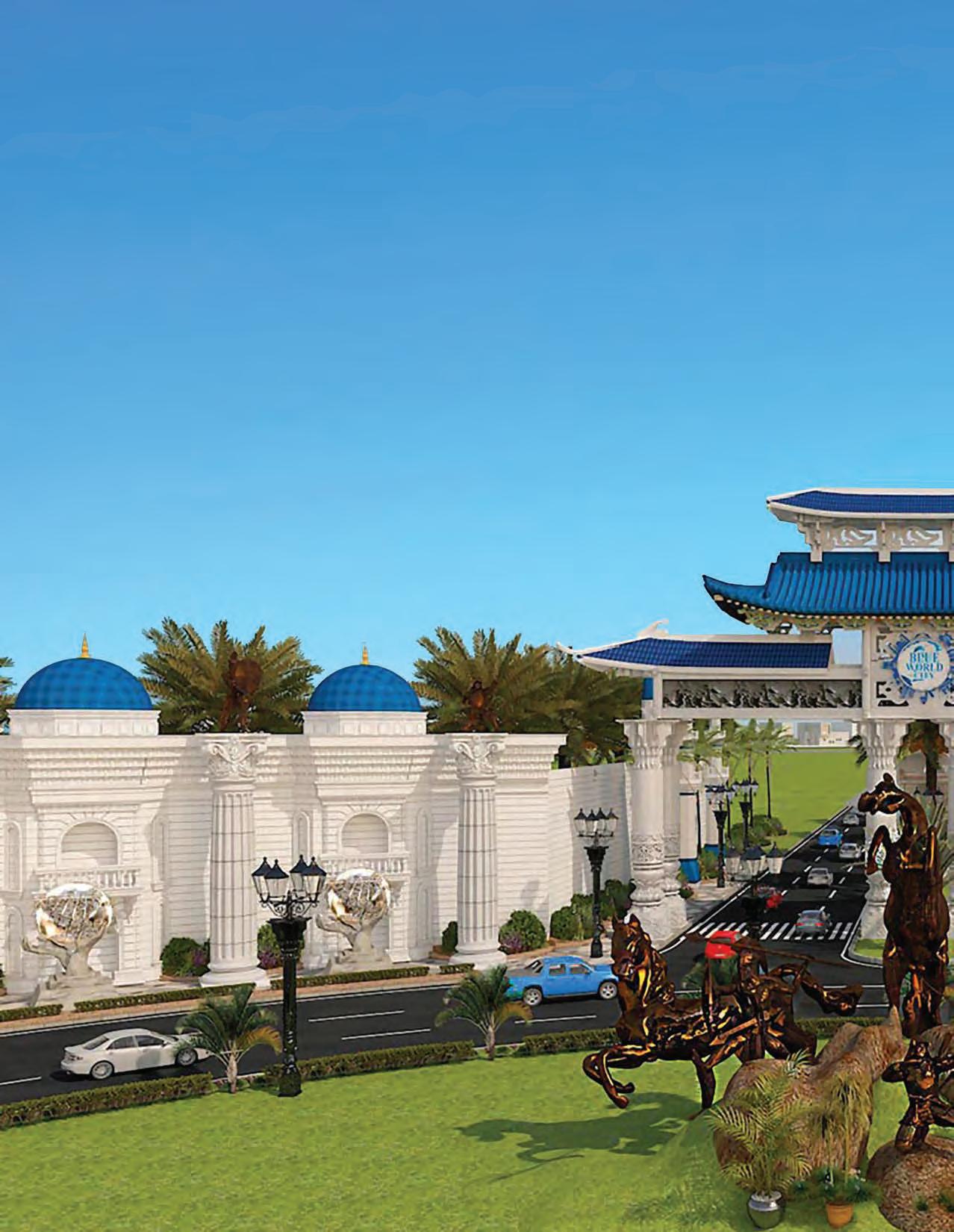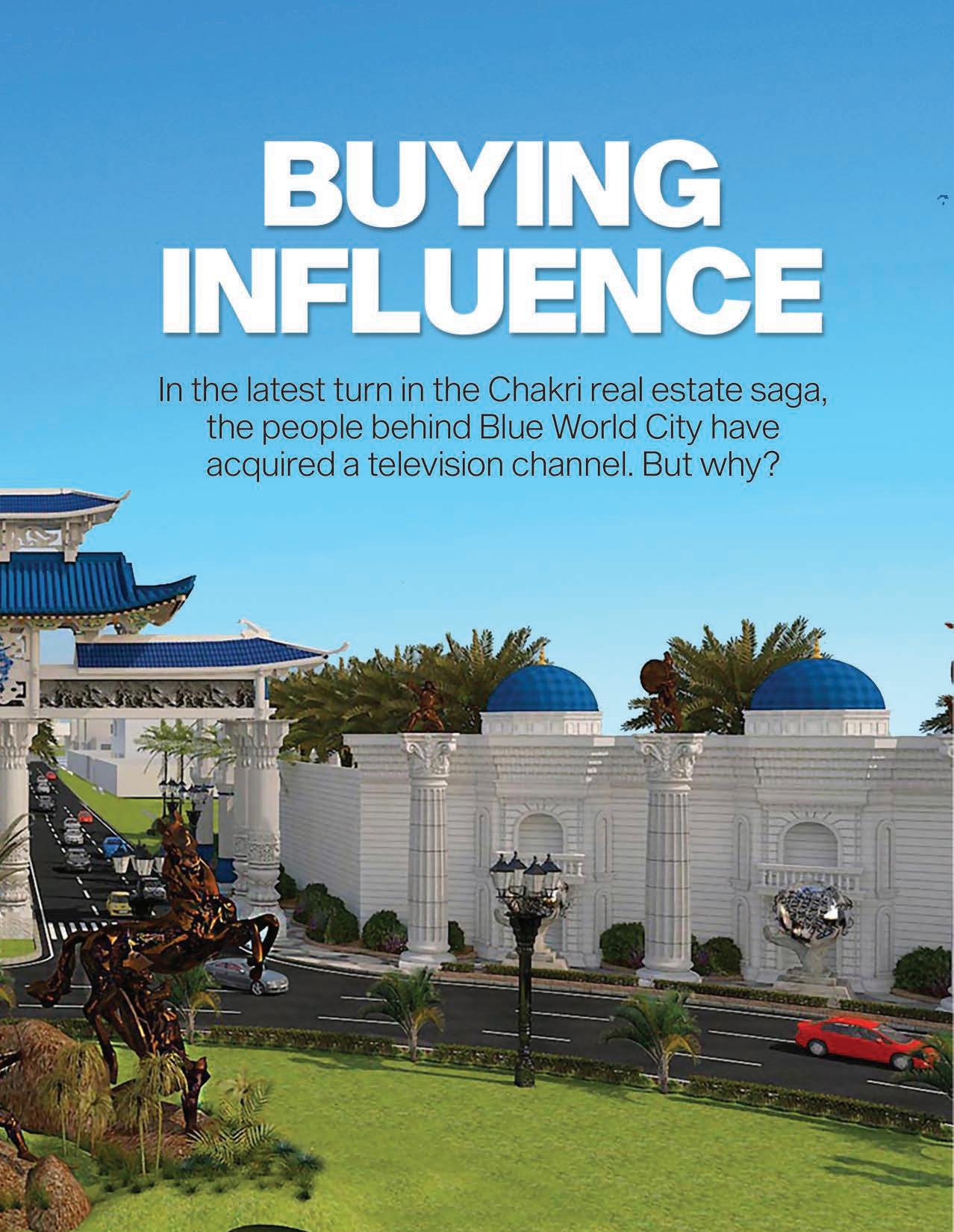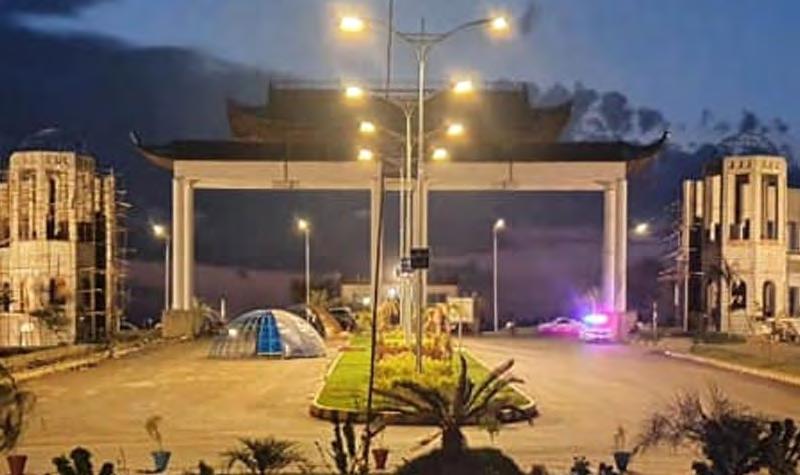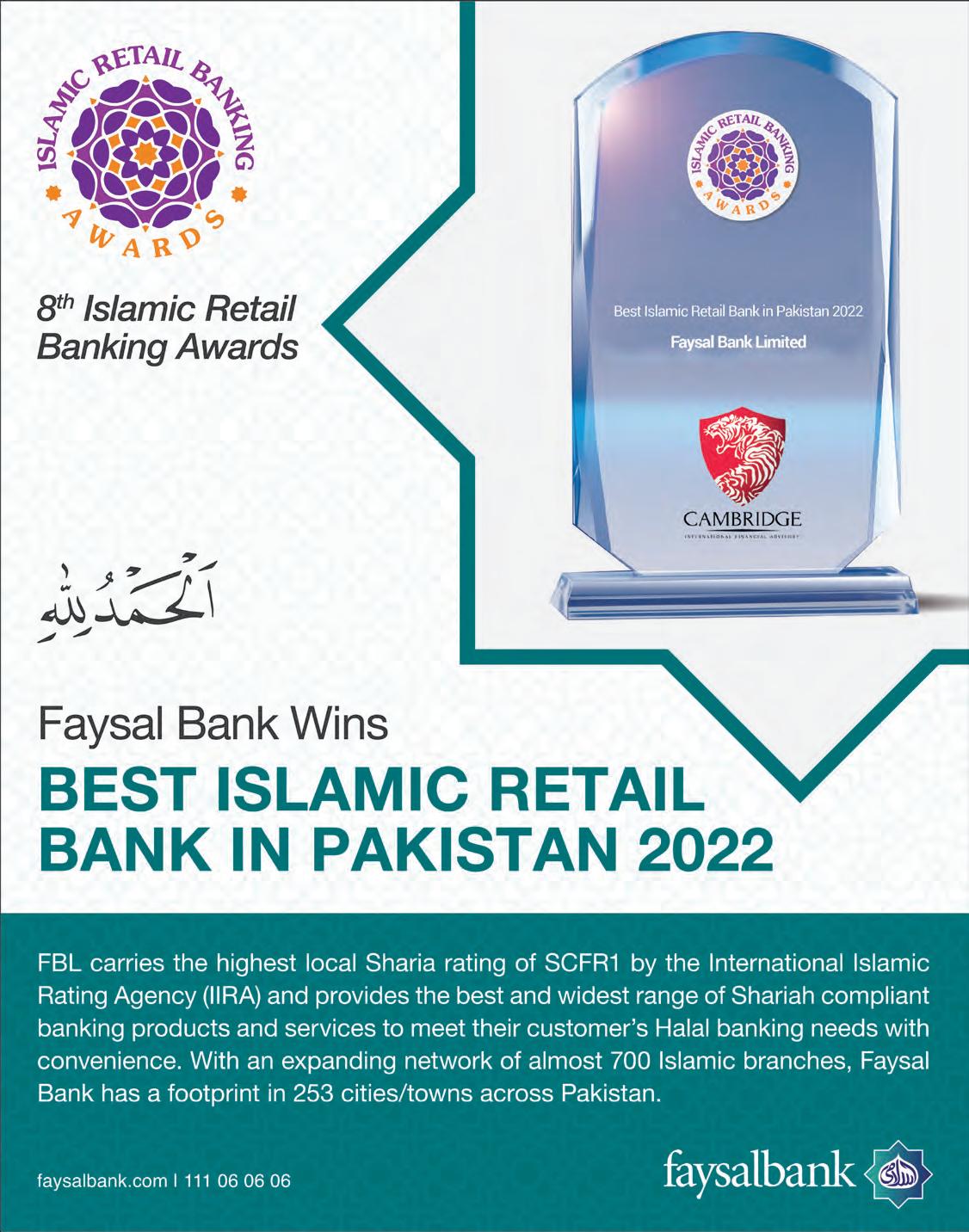
10 minute read
Buying influence

Afew months ago, a new current affairs television channel hit Pakistan’s airwaves. By all estimations this wasn’t a big deal. Pakistan’s media is a bloated, ungainly, over-saturated behemoth running simply on its own inertia. New news channels being launched and old ones shutting down is an everyday occurrence.
Advertisement
What is often interesting, however, is who the owners of these channels are. Just take a look at the case of Suno TV, the brand new channel in question. Suno’s launch was accompanied by a significant marketing campaign. A drive around Lahore would show that the channel had spent a pretty penny on plastering their logo on any billboard and street light available. Among their roster they boasted a number of well-known analysts, journalists, and TV talking-heads that are household names.
What was more interesting was the channel’s initial test run. Before going live on air, channels air stock footage on loop to test the running efficiency of their broadcast. In this phase, the stock footage Suno TV was running were ads for Blue World City — a real estate development project in Chakri on the outskirts of Islamabad.
So why is a brand new television channel broadcasting advertisements for a real estate project that has still not been approved by the Rawalpindi Development Authority (RDA)? In short, as officials of the Pakistan Electronic Media Regulatory Authority (PEMRA) have informed Profit, the news channel is owned and operated by the same group that owns the Blue World City project. According to an official of PEMRA’s licensing department, Suno’s licence is in the name of a company formed for this very purpose. And while Blue World’s CEO Chaudhry Saad Nazir is not involved directly, PEMRA has said that they are aware the channel is backed by the Blue World group.
That brings us to our next question. What kind of business expansion results in real estate developers investing money in a news and current affairs television channel? The news media business is a dead-end. With ad revenues down and the digital medium gaining more traction by the day, the profit motive is definitely out of the question. Even if you were to not consider the censorship aspect, and even if you made a big splash and have a lot of resources, chances are that if you started a news channel tomorrow you would be much more likely to bleed out money and fail than you are to make even a small profit.
So what drives so many people to open television channels? The answer is influence. While news channels may not make you much (or for that matter any) money, they do give you a powerful platform that can be used to craft and deliver your own narrative. A number of influential people have bought television channels over the years. Just last year, former PTI Senior Minister in Punjab Aleem Khan was in talks to buy Samaa — one of the biggest television news channels in Pakistan.
Over the past few years, Blue World have found themselves in a number of different controversies that may have given them the desire to find their own foothold in the news media. But what is the Blue World story?

Real estate is a dirty business in Pakistan. Blue World City is currently unapproved by the RDA, and with the tensions high in Chakri there is a chance that they will once again find themselves in the eye of the media over different controversies. Having a television channel of their own gives them some influence to counter any critical reporting
The Blue World Saga
It starts with Chakri. Outside the boundaries of Islamabad and Rawalpindi, this rich swathe of land had long been earmarked as a potential moneymaker by real estate developers. Currently, according to details available with Profit, there are at least 50 housing societies vying for space in the area around the Chakri interchange, where they believe a new city extending out of Islamabad and Rawalpindi will attract investors. The only problem is that the land in Chakri is a quagmire of legal cases, feuds, and disputed ownership that now has multiple parties involved. In Pakistan, real estate development is a game of gambling. No single investor or group has enough money to buy thousands of kanals of land, develop it, and then start to sell the plots to people. So instead of doing all this hard work, they focus on marketing heavily, selling pre-registration certificates, files for plots to be allotted in the future, and by getting property dealers to hype up their upcoming housing societies. It is only after they have made enough money by selling files, certificates, and all kinds of marketing tools to gather the capital they need for these projects, that they actually start buying the land that they have promised a number of people in the form of files. The problem is, since the land has not been acquired completely as of yet, it either gets sold to someone else in the meantime or some legal issue arises over it, which means people who buy files in these societies end up having their money tied up for years on end. All of this they do without getting any prior permission from local authorities, so even if the land is successfully acquired, it may be a long time before they are given permission to build their society on it. Most of these societies in Chakri have no standing with the Rawalpindi Development
Authority, which is the governing body on such issues. Despite this, they continue to inflict violence on each other and fight over disputed land, all the while fooling unwitting investors into giving them their money. Initially, when it was launched in 2017, Blue World City was only one of these small fish in a big pond. By 2018, however, they started appearing as a big name. Having presumably collected a decent amount from initial sales of files, they went on a massive marketing campaign that used all of the tactics mentioned above and then some. They even roped in Engin Altan, the Turkish actor who plays the lead role in the Ertugrul Resurrection drama series that has become a phenomenon in Pakistan, to be their brand ambassador. Since those early high flying days when Blue City became one of the hottest names in the Chakri real estate market, things have gone south. The society still does not have approval from the RDA and the land authority says it is not planning to give its approval any time soon. In fact, on recommendation of the RDA, Blue City is being investigated by the National Accountability Bureau (NAB), and has not bought a fraction of the land they claim to already be in possession of.
What has followed have been gang-wars between different housing societies in the region, with Blue World particularly clashing with rival society Abdullah City. The situation has since been eerily calm, but with the RDA continuing to not give Blue World City the green light and Blue World City continuing to sell files despite this being in clear violation of the law. In fact, in a recent message posted on social media, Blue World’s chairman Chaudhry Saad Nazir said that they were developing an overseas block, a general block and were planning on opening new ventures as well.
The legality question
Most of the societies in the Chakri area are not registered with the RDA. It is a classic case of having the cart before the horse. Any real estate developed should first acquire the land, get permission from the authorities, and then start marketing and selling the project. Instead Blue World, and other societies like Abdullah City, began by marketing it first, then trying to (unsuccessfully) get permissions, and then trying to (unsuccessfully) acquire the land. In the process, gun battles have left one dead, Blue World City staged a protest on the motorway by blocking it, and had one of their directors, Chaudhry Naheem Ijaz, arrested in the process back in March 2021. Normally, the bigger housing societies do go through all of these hoops and then start selling more plots than they own. For example, if a developer has 500 plots, he may book 5,000 plots and then dodge the people. While this is illegal, the entire premise of the project is not illegal. In Blue World’s case, they seem to have taken it to another level. On August 8, 2018, they got verification from the district council, which was only the first step. They sent this verification to the RDA and began selling plots and marketing their society as “approved”, before it had actually been. But then four days later, on August 12, 2018, the RDA declared Blue World City an illegal housing society. Blue World has since got planning permission twice, and moved since from illegal status to unapproved status. Despite this change in status, they are still not supposed to be conducting any business but have continued to sell plots and expand.
All of this, and they still neither have any land that they own despite having sold thousands of files, and they also continue to get denied permission from the RDA. In the process, they have turned Chakri into gangland. Getting young boys in at salaries of Rs 25,000 to Rs 30,000, as told to Profit by the police, to move around with guns and strike terror into the hearts of their opponents. Gun ranges have been established, and even the police are afraid of the consequences of what has become a quickly escalating and heavily armed situation.
Say, for example, you are a businessman that also has political or social interests. If there is a story breaking about you or your business in a newspaper or on a different channel, all you have to do is mobilise the journalists that work for your channel to tell another version of the story. Anyone that doesn’t comply can be terminated, and everyone will listen because you pay their salaries. It is a neat little solution, and one that happens far too frequently
The television news angle
Real estate is a dirty business in Pakistan. Blue World City is currently unapproved by the RDA, and with tensions high in Chakri there is a chance that they will once again find themselves in the eye of the media over different controversies. Having a television channel of their own gives them some influence to counter any critical reporting. There is still a shroud of mystery surrounding this. As mentioned earlier, the news channel is not owned directly by Blue World City or by its chairman Chaudhry Saad Nazir. Profit reached out to officials from Blue World City for comment but did not receive any response despite multiple attempts. “The channel Suno TV is a news and current affairs channel that has been granted this licence. PEMRA is also aware that the channel is associated with the real estate developers that are behind the Blue World City project in Chakri,” said a high-ranking official of PEMRA’s licensing department.
“We cannot name the company that holds the licence, but we can say that Chaudhry Saad Nazir is not even the person that is at the helm of this company. There are other frontmen who are handling this but we have clear information that this is how things are being run, and it is nothing new. A number of businesspeople have opened channels. In fact, there is more than one channel that is also backed by Malik Riaz. The system they follow is always the same as creating a company and getting a licence in its name,” added the official. The possession of a television news channel comes with influence. Say, for example, you are a businessman who also has political or social interests. If there is a story breaking about you or your business in a newspaper or on a different channel, all you have to do is mobilise journalists who work for your channel to tell another version of the story. Anyone who doesn’t comply can be terminated, and everyone will listen because you pay their salaries. It is a neat little solution, and one that happens far too frequently.
Pakistan’s news media is already greatly saturated. As of late 2017, 89 satellite TV licences have been issued by PEMRA. Another 29 foreign channels had been granted landing rights. At least 30 private TV channels, prominent among them Geo News, Dawn News, Aaj TV, ARY News, Capital TV, Samaa, Dunya News, Waqt News, and Express News, exclusively broadcast news and current affairs programmes. While this expansion was genuine in the late 2000s, over time the news media business has too many players and too little money. Since this is not a money-making business, all that is left behind is a game of influence. And that is exactly the game being played here. Only time can tell what will become of it. n








